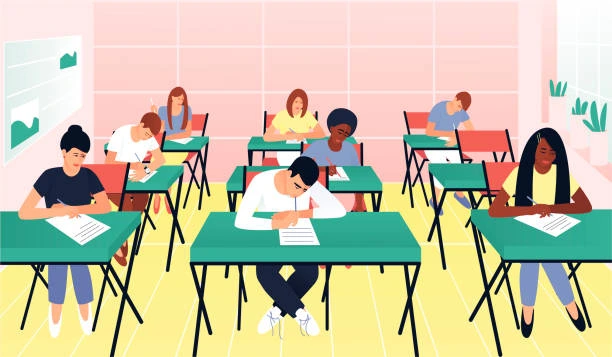Mastering Standardized Tests: Study Smarter, Score HigherApril 10, 2025

Standardized tests like the SAT, ACT, and AP exams play a crucial role in college admissions,
scholarships, and academic placement. A strategic and disciplined approach to studying can help
you maximize your score and reduce test-day stress. Here’s how to study effectively for
standardized tests and set yourself up for success.
1. Understand the Test Format and Structure
Before you dive into studying, familiarize yourself with the format, timing, and question types of
the test you’re taking. Knowing the number of sections, the types of questions, and how the test
is scored will help you create a more effective study plan.
● Review official test guidelines from the College Board (SAT, AP) or ACT.org.
● Take a diagnostic practice test to assess your strengths and weaknesses.
● Understand how penalties for incorrect answers (if any) impact your strategy.
● Learn about adaptive testing formats, if applicable, and how they influence question
difficulty.
2. Create a Realistic Study Plan
A well-structured study plan will keep you on track and prevent last-minute cramming.
● Start preparing at least three to six months before the test to allow time for gradual
improvement.
● Set clear study goals, such as mastering one test section per week.
● Schedule regular practice tests to track progress and adjust your strategy.
● Break studying into manageable chunks to prevent burnout and maximize retention.
● Utilize a study planner or app to organize study sessions efficiently.
3. Use High-Quality Study Materials
The right resources make all the difference. Stick to trusted test prep books, online courses, and
official practice tests.
● Official Prep Books: The SAT Official Guide, ACT Prep by ACT.org, and AP study
guides from the College Board.
● Online Platforms: Khan Academy (SAT), The Princeton Review, UWorld, and Kaplan.
● Flashcards & Apps: Quizlet and Anki for vocabulary and quick review sessions.
● YouTube Tutorials & Online Courses: Engage with test-prep instructors and interactive
lessons to reinforce concepts.
● Tutoring Services: If self-study isn’t enough, consider online tutoring programs
specializing in standardized test preparation.
4. Develop Effective Test-Taking Strategies
Knowing how to approach questions strategically can help you work smarter, not harder.
● Time Management: Allocate time per section and skip tough questions to return to later.
● Elimination Technique: Narrow down answer choices by eliminating obviously wrong
options.
● Pacing Strategy: Practice under timed conditions to improve your speed and efficiency.
● Answer Every Question: On tests without a guessing penalty, always provide an
answer—even if unsure.
● Recognize Question Patterns: Understanding how questions are structured can help
anticipate correct answers.
● Use the Process of Deduction: If unsure, break down the question logically and analyze
answer choices carefully.
5. Practice with Full-Length Mock Tests
Taking full-length practice tests under real exam conditions is one of the most effective ways to
prepare.
● Mimic actual test conditions (quiet environment, timed sections, no distractions).
● Identify patterns in mistakes and work on weak areas.
● Analyze results to adjust study focus and improve time management.
● Take at least three to five full-length tests before the actual exam to build endurance.
● Review answers thoroughly after each test to understand errors and reinforce learning.
6. Strengthen Weak Areas
Focusing on weak subjects or question types ensures balanced performance across all sections.
● Review incorrect answers thoroughly and understand why you got them wrong.
● Seek help from teachers, tutors, or online forums for challenging topics.
● Incorporate different learning techniques (videos, interactive exercises, tutoring sessions).
● Utilize adaptive learning tools that provide customized practice based on individual
weaknesses.
● Study difficult concepts with spaced repetition to reinforce retention over time.
7. Stay Healthy and Manage Stress
A healthy body and mind improve focus and retention.
● Get adequate sleep before study sessions and test day.
● Maintain a balanced diet and stay hydrated.
● Take short breaks during study sessions to prevent burnout.
● Practice relaxation techniques like deep breathing and mindfulness.
● Avoid excessive caffeine or sugar intake, which can lead to energy crashes.
● Incorporate light exercise or stretching to reduce stress and improve concentration.
8. Prepare for Test Day
Being well-prepared for test day will help reduce anxiety and ensure a smooth experience.
● Pack essentials: admission ticket, ID, calculator (if allowed), and snacks.
● Dress in comfortable layers to adjust to room temperatures.
● Arrive early to avoid unnecessary stress.
● Skim through the test before starting to get a sense of difficulty levels.
● Bring a wristwatch to track time effectively (if permitted).
● Stay confident and trust your preparation.
9. Leverage Post-Test Strategies
Your test-taking journey doesn’t end after submitting your exam. Take these steps to maximize
future opportunities:
● Analyze your score report to identify strengths and weaknesses for possible retakes.
● Consider whether to retake the test based on your target college requirements.
● Utilize Score Choice (if available) to send only your best scores to colleges.
● If scores are lower than expected, explore test-optional or test-flexible college policies.
FAQs: Your Standardized Test Questions Answered
1. How early should I start preparing for standardized tests?
It’s best to start preparing at least three to six months before the test to allow gradual
improvement and avoid last-minute cramming.
2. How many practice tests should I take?
Aim for at least three to five full-length practice tests before the actual exam to build stamina and
track progress.
3. What are the best free resources for test preparation?
Khan Academy (SAT), ACT.org, and College Board offer excellent free resources, including
practice questions and full-length tests.
4. How can I improve my test-taking speed?
Practice under timed conditions, use pacing strategies, and work on recognizing question patterns
to improve efficiency.
5. Is tutoring necessary for high scores?
Tutoring isn’t mandatory, but it can be helpful for targeted improvements, especially in weak
areas.
6. Should I retake the test if I’m not happy with my score?
It depends on your target colleges. If your score is significantly below their average, retaking the
test with better preparation might be beneficial.
Final Thoughts
Standardized tests don’t just assess what you know—they test how well you can apply
knowledge under pressure. By following these study techniques, practicing consistently, and
maintaining a positive mindset, you’ll be able to boost your confidence and achieve a high score.
Success in standardized testing is all about preparation, strategy, and perseverance. Invest time in
structured study habits, seek support when needed, and approach test day with confidence.
Happy studying, and good luck!
Schedule a Free Consultation and Know more!




